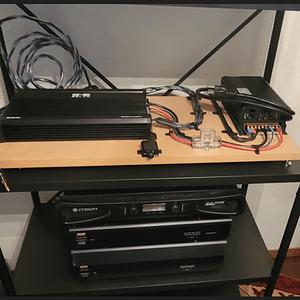Hair trick
- Thread starter SuperScion9000
- Start date
- Replies 105
- Views 9K
You are using an out of date browser. It may not display this or other websites correctly.
You should upgrade or use an alternative browser.
You should upgrade or use an alternative browser.
-
19Participant count
-
Participant list
los33
Car Audio G
You can wall a car also //content.invisioncic.com/y282845/emoticons/wink.gif.608e3ea05f1a9f98611af0861652f8fb.gif just gotta take the back seat out and use trunk as addon space for wall.I've told you 100 times already...I'm not in it to meter.
---------- Post added at 12:49 AM ---------- Previous post was at 12:48 AM ----------
A wall in a trunk? lol
Sent from my Moto G4 using Tapatalk
Boomin_tahoe 5,000+ posts
Hurtin' feelings errrday.
Whhhhooooooo caaaaaaaaaaaaaaaresi been doing this **** long before you tards thought about it..
You and your asinine comments. //content.invisioncic.com/y282845/emoticons/waycrazy.gif.f4a380c3f94043939fd369defd9e6be2.gifi been doing this **** long before you tards thought about it..
Boomin_tahoe 5,000+ posts
Hurtin' feelings errrday.
He's always gotta be above everybody else/thinks he's better than any of us.You and your asinine comments. //content.invisioncic.com/y282845/emoticons/waycrazy.gif.f4a380c3f94043939fd369defd9e6be2.gif
hispls 5,000+ posts
CarAudio.com Veteran
It's hardware + the software. I bought mine for around 100 even IIRC. Try to do TS parameters for an unknown driver long-hand with DMM only and it's worth the 100 bucks really fast.Dang that one program is $130....
I'll just use some graph paper lol...
Ohm's law says P=IE frequency is not part of the equation.Higher frequencies have a higher current draw.
Papermaker85 5,000+ posts
Banned
lets make a bet then. we will use someone neutral to hold the money and winner takes all.He's always gotta be above everybody else/thinks he's better than any of us.
Boomin_tahoe 5,000+ posts
Hurtin' feelings errrday.
Ya ok I bet you don't go to that show coming up lol. Last few times even @LosIsATool mentioned a few in the past and all you did was come up with lame excuse not to go.
Papermaker85 5,000+ posts
Banned
[quote name='Boomin_tahoe']Ya ok I bet you don't go to that show coming up lol. Last few times even @LosIsATool mentioned a few in the past and all you did was come up with lame excuse not to go.[/QUOTE]
it was 300 miles and i was moving jackass. put your money up. bitch
ill be nice and bet 100. next time its 1000
it was 300 miles and i was moving jackass. put your money up. bitch
ill be nice and bet 100. next time its 1000
528hz 10+ year member
Everything'sMiscellaneous
That is true by that formula...but why is it that...say for instance you are running a "sufficient" electrical setup for a 2000 watt setup. Why is that you typically see your lights dim more or voltage drop more at higher frequencies? Does ohms law get thrown for a loop when you also must take into consideration impedance rise? I mean we all know heat is a primary cause for impedance rise, but the dynamics of the box itself had to play a roll too I assume...It's hardware + the software. I bought mine for around 100 even IIRC. Try to do TS parameters for an unknown driver long-hand with DMM only and it's worth the 100 bucks really fast.
Ohm's law says P=IE frequency is not part of the equation.
Ohms law is only applied to a consistent, constant?
Papermaker85 5,000+ posts
Banned
the lights dim from voltage sag.That is true by that formula...but why is it that...say for instance you are running a "sufficient" electrical setup for a 2000 watt setup. Why is that you typically see your lights dim more or voltage drop more at higher frequencies? Does ohms law get thrown for a loop when you also must take into consideration impedance rise? I mean we all know heat is a primary cause for impedance rise, but the dynamics of the box itself had to play a roll too I assume...
Ohms law is only applied to a consistent, constant?
hispls 5,000+ posts
CarAudio.com Veteran
V is (mostly) constant since that's how our amps work, but current changes with impedance. Your amp will need to draw more current and will make more power at low impedance points but where and how dramatic is completely dependent on your subs/box/tuning.That is true by that formula...but why is it that...say for instance you are running a "sufficient" electrical setup for a 2000 watt setup. Why is that you typically see your lights dim more or voltage drop more at higher frequencies? Does ohms law get thrown for a loop when you also must take into consideration impedance rise? I mean we all know heat is a primary cause for impedance rise, but the dynamics of the box itself had to play a roll too I assume...
Ohms law is only applied to a consistent, constant?
Also worth considering is your amp's efficiency is typically not nearly as good as published as you drop impedance or if you're not playing right at the verge of clipping.
Papermaker85 5,000+ posts
Banned
@ boomin_tahoeit was 300 miles and i was moving jackass. put your money up. bitchill be nice and bet 100. next time its 1000
HardcoreBob
Senior VIP Member
Boomin_tahoe 5,000+ posts
Hurtin' feelings errrday.
Activity
No one is currently typing a reply...
About this thread
New threads
-
-
-
-
2 more questions about the Kenwood DDX9907XR / DMX907S
- Started by fadetoblack73
- Replies: 0
-


